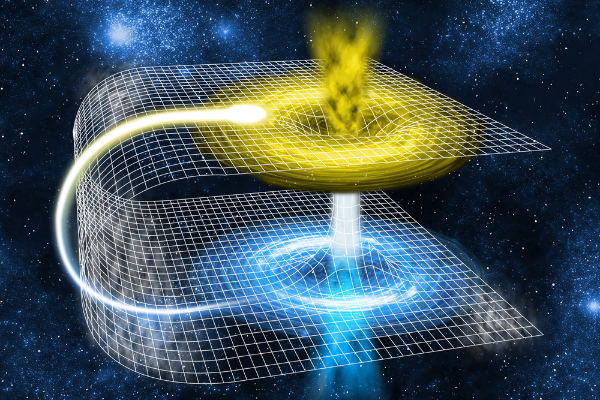 Physicists at the University of Queensland in Australia have used photons – single particles of light – to simulate quantum particles travelling through time and study their behaviour.
Physicists at the University of Queensland in Australia have used photons – single particles of light – to simulate quantum particles travelling through time and study their behaviour.
They were hoping to find out more about whether time travel would be possible at the quantum level – a theory first predicted in 1991.
In the study, the researchers simulated the behaviour of a single photon that travels through a wormhole and interacts with its older self. This is known as a closed timelike curve – a closed path in space-time that returns to the same starting point in space but at an earlier time. Their study is published in Nature Communications.
They did this by making use of a mathematical equivalence between two cases, lead author Martin Ringbauer told The Speaker.
In the first case, photon one “travels trough a wormhole into the past, then interacts with its older version,” Ringbauer explained. And in the second case, photon two travels through normal space-time, but interacts with another photon that is trapped inside a closed timelike curve forever.
“We used single photons to do this but the time-travel was simulated by using a second photon to play the part of the past incarnation of the time travelling photon,” said University of Queensland physics professor Tim Ralph.
The research will hopefully help researchers bridge the gap between two critical theories, said Ringbuaer.
“The question of time travel features at the interface between two of our most successful yet incompatible physical theories – Einstein’s general relativity and quantum mechanics,” Ringbuaer explained.
“Einstein’s theory describes the world at the very large scale of stars and galaxies, while quantum mechanics is an excellent description of the world at the very small scale of atoms and molecules,” he added.
According to Einstein’s theory, it could be possible to travel back in time by following a closed timelike curve. However physicists and philosophers have struggled with this theory given the paradoxes such as the grandparents paradox, where a time traveller could prevent their grandparents from meeting, thus preventing the time traveller’s birth in the first place.
But in 1991 it was suggested that time travel in the quantum world would avoid these kinds of paradoxes because the properties of quantum particles are “fuzzy” and “uncertain” – and this is the one of the first times anyone has simulated the behaviour of such a scenario.
“We see in our simulation (as was predicted in 1991) how many effects become possible, which are forbidden in standard quantum mechanics,” said Ringbauer. “For example it is possible to perfectly distinguish different states of a quantum system, which are usually only partially distinguishable. This makes quantum cryptography breakable and violates Heisenberg’s uncertainty principle. We also show that photons behave differently, depending on how they were created in the first place.”






6 Comments on “Time travel simulated by Australian physicists”
Damn interesting!Would love to know what follow up experiments are in the pipeline!
I think that the premise of time travel is a little weird, because it assumes that time travel and time are linear. I think that this premise is flawed. There is no linearity in time or of time. If all the “manifest” that is present in the universe would become un-manifest, Space and time would both disappear. There is an interesting take on this in the “Yoga Vasistha” , the dialogue between Lard Ram and sage Vasistha. The Past Present and Future coexist simultaneously. Current Scientists in Quantum Physics should take the cue from the ancient Hindu texts as to the meaning and implications of what Sage Vasistha said and see how it can help in arriving at valuable clues to the subject of Time Travel in the manifest.
If consciousness is the only ultimate reality then it would appear that everything that was, is and/or will be, is; and if perhaps matter in time could move along space/time through a wormhole, then maybe the perceived paradoxes could perhaps be irrelevant insofar as it it would seem to be very improbable that the connecting ends of a wormhole could be close enough to allow for a perceived paradox … I think the Stargate series lays it out very well travelling along a very big space/time timeline … does that make any sense?
I think that when it comes to paradoxes, the idea itself is perfectly plausible because we simply do not know the true nature of space-time. To me it seems to only travel in one direction or not at all. Time is the rate at which something travels through space. You could liken it to common coordinate systems, but until the light shines, we will be in the dark. I certainly don’t know better than any physicist, that’s just my two cents.
If time and time traveler are linear and only one directional, then time travel would be unlikely, but if were look at existence behaving similar to light and everything happened at different frequencies then one could perhaps move over to a earlier time but it’s not a certain bet that it would even be our own dimension (frequency change), bit a very similar timeline with small or very huge differences.
Time is a measured rate of change. a concept to understand the tangible like an inch, or a pound.
We can rename time and call it reposition difference, and it would be the same thing. We can only travel through the concept. everything is fixed in now, memory is past and future is rate of change.